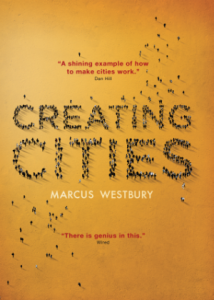Niche Press
September 2015
 Renew Newcastle is one of those ideas that hits you in the face like a wet fish; you didn’t see it coming and now you’re suddenly quite alert. It’s the simplicity of the idea that is so striking; if your city is full of empty spaces then fill those spaces with art. Creating Cities takes us through the formation of an idea that rallied against the assumption that city planning was a top-down process, and showed that community and a bit of unconventional thinking could achieve what years of strategic planning could not.
Renew Newcastle is one of those ideas that hits you in the face like a wet fish; you didn’t see it coming and now you’re suddenly quite alert. It’s the simplicity of the idea that is so striking; if your city is full of empty spaces then fill those spaces with art. Creating Cities takes us through the formation of an idea that rallied against the assumption that city planning was a top-down process, and showed that community and a bit of unconventional thinking could achieve what years of strategic planning could not.
In the early 2000s, the once-industrial city of Newcastle was facing high unemployment and streets of empty storefronts. Through a quirk of property valuation, it was better for owners to keep storefronts empty than to rent below market rate. The presumed solution to Newcastle’s revitalization was to invest and develop in large-scale projects. But somehow, they never seemed to get approved. And that’s when a small group of arts managers became restless.
As people who were teethed on low budget, DIY projects, Westbury and co couldn’t help but see those storefronts as venues, and galleries, and community spaces. An idea began to form. If property owners were worried about low rents affecting valuation, then ask for donated spaces. If owners didn’t want properties locked off from paying tenants, then spaces would be donated on a rolling monthly basis. Bit by bit, the idea grew and eventually became Renew Newcastle, which has now homed dozens of projects, several of which have gone on to establish businesses full-time.
As a cultural institution, Renew Newcastle is an ingenious experiment in how to shape place not by overcoming limitation, but by embracing it wholeheartedly.
As a book, unfortunately, Creating Cities doesn’t quite deliver on its potential. It’s somewhat padded, repetitious, and occasionally suffers for the author’s blinkered viewpoint. Perhaps setting expectations is important; Creating Cities is not about applying the Renew Newcastle model onto cities in general, nor is it the story of Renew Newcastle as a collaborative process; however, calling the book Creating Cities creates an expectation of wider practical discussion, and its absence may leave readers feeling wanting. Rather, the book is Marcus Westbury’s personal experience of the development of the idea, and its eventual execution. This perspective offers a mixed bag of strengths and weaknesses.
On one hand, Westbury shines in his remembrances of time living in, and returning to, Newcastle. If a city could be a spiritual totem, than Westbury has found his. On the other hand, in focusing so tightly on his own point of view, Westbury makes it difficult to disentangle the importance of his involvement in Renew Newcastle over fellow collaborators. Creating Cities is Marcus Westbury’s story, and while others do get a look in, they seem to play the part of cardboard figures rather than fleshed out people with their own lives and dreams. It’s a difficult thing to write an autobiography and bring others to life; Creating Cities may have benefitted from third party chronicler.
Furthermore, Westbury’s footing becomes quite unstable when philosophising on urban planning or trends in small business development. While these are topics that Westbury is clearly passionate about, he is largely coming from a place of opinion and intuition, which makes for an interesting conversation at the pub with friends but is not particularly satisfying in a published work.
Creating Cities would perhaps have been better suited to a long essay format than this (admittedly slim) volume. Nevertheless, at its core the book delivers a call to action; don’t wait for permission to shape your city. Don’t let others tell you what can’t be done. Just fucking do it.

